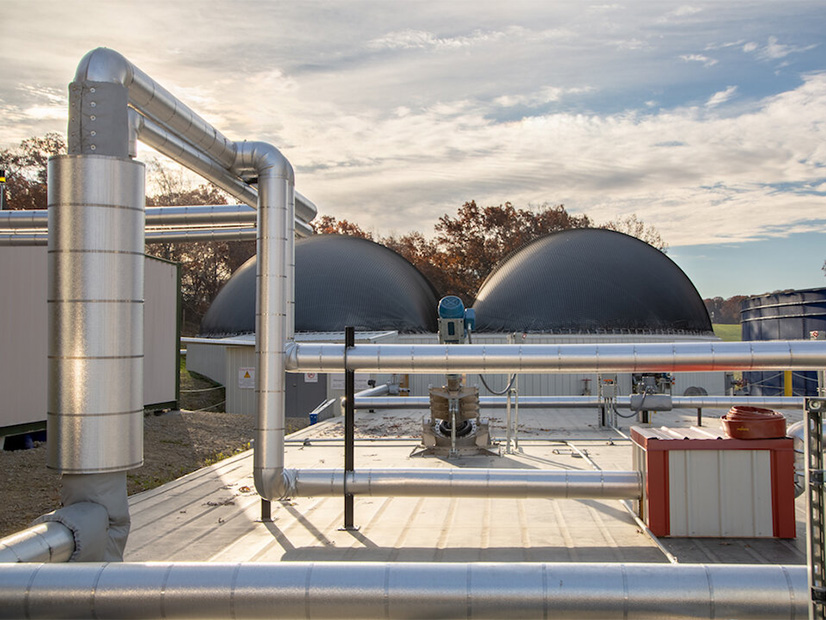
National Grid (NYSE:NGG) is proposing to transition its natural gas service in Massachusetts to 100% fossil-free gas by 2050 to help the state meet its decarbonization goals.
The utility filed a Net-zero Enablement Plan Friday with the Massachusetts Department of Public Utilities for the regulator’s investigation into the role of gas distribution companies in reducing greenhouse gas emissions.
Eliminating fossil fuels from National Grid’s gas supply would require pursuing delivery of renewable natural gas (RNG) and renewable hydrogen to all customer classes, the utility said in the plan. National Grid’s proposal builds on recommendations in an Energy & Environmental Economics (E3) report filed Friday in the “Future of Gas” docket (20-80) that identified eight decarbonization pathways for the state.
Each pathway achieves net-zero GHGs by 2050 compared with 1990 levels at varying costs, and they offer options ranging from ongoing use of the gas distribution network to complete network decommissioning across the state. Key components of National’s Grid net-zero proposal align with the consultant report’s Hybrid Electrification pathway, according to the plan.
A hybrid pathway balances benefits and challenges of electrification and decarbonized fuels by limiting renewable fuel use and mitigating issues related to electric infrastructure expansion, the consultant’s report said. Of the eight pathways, the hybrid approach had the least cumulative cost, $64-$92 billion. Scenarios that included high levels of electrification for buildings and 100% gas network decommissioning had the highest cumulative cost, $87-$135 billion.
While the hybrid pathway is based on 100% renewable gas for residential and commercial customers only, National Grid proposed extending that transition to industrial customers as well. The utility also would expand on the pathway through networked geothermal system deployment and deep energy efficiency measures that address building envelopes and appliances. (See National Grid Wins Approval for $15.6M Geothermal Demo.)
In a separate report filed Friday on regulatory considerations related to the eight pathways, E3 determined that a gas utility transition to renewable fuels is limited by supply and the state’s regulatory structure. Based on E3’s findings, National Grid said the state must authorize gas utilities to develop an RNG procurement program that offers competitive solicitations.
In addition, the utility called for the state to implement a Renewable Heating Fuel Standard that directs natural gas providers to procure an increasing portion of supply from clean fuels, such as RNG or hydrogen.
Eversource Energy (NYSE:ES), the second largest gas distribution utility in Massachusetts behind National Grid, made minor commitments to fossil-fuel alternatives in its decarbonization plan filed Friday. The utility submitted an operational plan covering 2023-2025 with proposed initiatives to:
- conduct market assessments for in-state and out-of-state RNG;
- procure RNG from a locally sourced project;
- develop a small-scale demonstration project for RNG storage at a liquified natural gas site;
- assess hydrogen blended into its gas network by up to 2% by volume; and
- develop hydrogen pilots to examine re-purposing the gas network to transport hydrogen.
Eversource also wants to develop a pilot for hybrid air-source heat pump systems that link to auxiliary natural gas furnaces. The pilot would test demand response and fuel switching of customers using the hybrid heat-pumps during winter peaks. Eversource also plans to expand a networked geothermal pilot it launched last year into a comprehensive utility-scale program.
Liberty Utilities, Unitil (NYSE:UTL) and Berkshire Gas filed their net-zero plans with the DPU Friday, each identifying some level of commitment to decarbonized gas supply.
Berkshire plans to offer biomethane from landfill gases in the near-term, while hydrogen and RNG, the utility said, could be long-term resources in some sectors, such as buildings and heavy-duty transportation. Liberty said it plans to offer increasing proportions of RNG to customers over time, and Unitil expects to establish targets for biomethane that would be capped at a certain cost threshold.
In a joint filing, the state’s five gas utilities asked the DPU to approve their net-zero plans along with a proposal to update them on a three-year cycle aligned with energy efficiency program planning.


